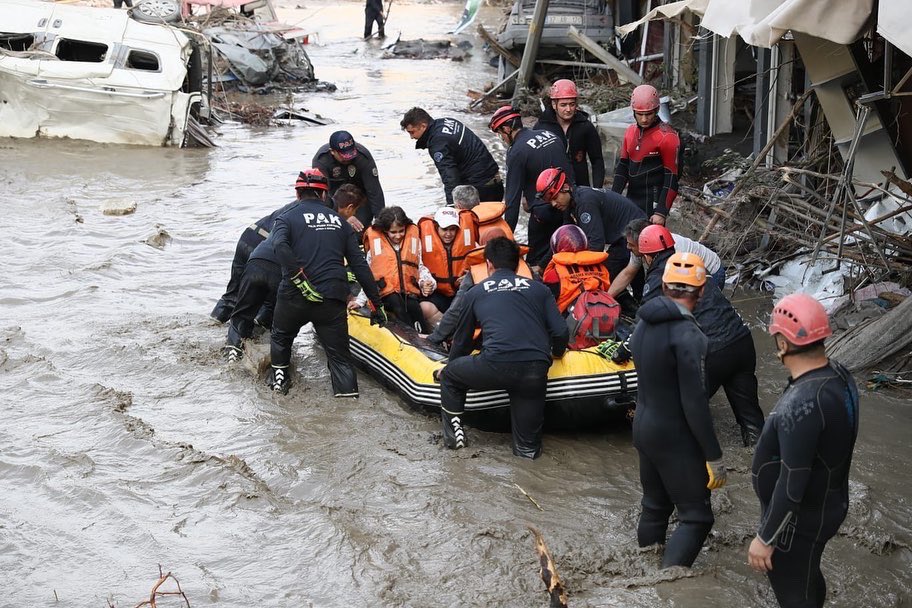Locals fear the worst after large swathes of northern Turkey has been left under water following torrential rain. Officially the death toll stands at 38, but that is expected to rise significantly as the waters recede.
One local official has claimed there may already be as many as 300 bodies, according to a report in Cumhuriyet newspaper.
The government has declared three Black Sea coastal provinces, Kastamonu, Sinop and Bartın, as ‘national disaster zones’, sending in the Turkish army and AFAD, Turkey’s national disaster agency, to aid the rescue missions.
Although Turkey is no stranger to flooding, particularly in its northern coastal areas where the terrain includes hundreds of villages located in valleys, the current situation is one of the worst in living memory. Interior Minister Süleyman Soylu described it as “the worst flood disaster I have seen” following a visit to the region on Thursday.
The flash floods have caused widespread devastation: buildings and bridges have collapsed, while rapidly flowing waters have swept people, vehicles and other debris away. Power lines have been severed, and heavy rain has caused multiple landslides. Roads have been heavily damaged too, hampering efforts to reach people.
In Kastamonu Province, which is one of the hardest hit, 32 people have died, with a further two killed in Sinop.
Mustafa Çukurkol, the Governor of Bozkurt Province, which has been wrecked by the floods, told television channel TV5 that he had received uncorroborated reports that between 250 and 300 bodies had been recovered and were awaiting identification.
“What we’ve gleaned so far is that there are about 250-300 bodies, whose identity haven’t been determined, and which have been collected in the district, but their identities have not yet been determined, and so far this is just hearsay. Official sources will confirm this in the coming hours. We received information that nearly 250 bodies were in a morgue in İnebolu; but it is necessary to confirm the accuracy of this.”
Mr Çukurkol’s comments were echoed by British Turks with relatives in Bozkurt who were rescued earlier today by helicopter.
Sel bölgesinde milletimizin yanındayız pic.twitter.com/kSxAUzVgj6
— Türk Polis Teşkilatı (@EmniyetGM) August 13, 2021
One London woman told T-VINE that her husband, who is currently in Turkey and originates from Bozkurt, had informed her yesterday that the “deaths are in the hundreds in Bozkurt.”
Her husband, who is on the other side of Turkey and had been planning to visit his family in the Black Sea region when the flooding put paid to his plans, received good news from his nephews this afternoon that his relatives, including his frail sister, had been rescued.
His wife said they were “very lucky” to escape after being “airlifted out by helicopter”, although their livestock had been lost. The relatives are “all well, but left with just the clothes they were standing in.”
A massive search and rescue operation is under way, with emergency services and army personnel helping to pluck people, who were trapped by the rising waters, and bring them to safety. Helicopters and boats have been deployed in the rescue missions, helping to evacuate at least 1,700 people.
Thousands of government workers, aided by volunteers, continue to work around the clock to help those left in the affected areas. It is thought some 330 villages have been left without electricity, after the floods damaged power lines.
Bartın, Kastamonu ve Sinop’ta yaşanan sel ve su baskınlarına müdahale çalışmaları 2.218 personel ile devam ediyor.
▪️1.307 vatandaşımız güvenli bölgelere tahliye edilmiştir.
▪️AFAD tarafından bölgeye 10 Milyon TL acil yardım ödeneği gönderilmiştir.
➡️ https://t.co/DsVbAodvlL pic.twitter.com/57w76o8ZhI
— AFAD (@AFADBaskanlik) August 12, 2021
One natural disaster after another for Turkey in 2021
This has been a tough year for Turkey, which has not only had to battle the coronavirus pandemic, but has also been plagued with multiple natural disasters occurring one after the other this summer.
In June, Turkey faced an ecological disaster as thick marine mucilage – or ‘sea snot’ – spread across the Sea of Marmara, affecting affecting its harbours and southwestern coastline.
At the end of July and in the first week of August, the country’s southern coastal areas were ablaze with huge wildfires. Eight people were killed and over 100,000 hectares (247,000 acres) scorched by some 300 fires that stretched from Marmaris to Mersin.
Turkey’s Black Sea province of Kastamonu has been hit by floods triggered by torrential rains. Raging waters damaged buildings and crops, washing away vehicles https://t.co/uVzxJ31sTl pic.twitter.com/xZYisqpQUG
— ANADOLU AGENCY (@anadoluagency) August 11, 2021
Turkey’s latest disaster came in the week that a major UN report warned of more extreme weather events because of human-induced global warming.
Europe has recorded some of its hottest temperatures on record, with Turkey’s neighbour Greece, as well as Italy and Spain all battling massive forest fires. In July, flash floods devasted parts of Germany and Belgium, killing 226 people.





